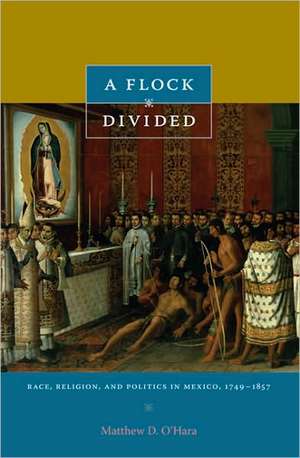A Flock Divided – Race, Religion, and Politics in Mexico, 1749–1857
Autor Matthew D. O`haraen Limba Engleză Paperback – 22 noi 2009
Preț: 246.92 lei
Nou
Puncte Express: 370
Preț estimativ în valută:
47.26€ • 49.21$ • 39.94£
47.26€ • 49.21$ • 39.94£
Carte indisponibilă temporar
Doresc să fiu notificat când acest titlu va fi disponibil:
Se trimite...
Preluare comenzi: 021 569.72.76
Specificații
ISBN-13: 9780822346395
ISBN-10: 0822346397
Pagini: 336
Ilustrații: 14 illustrations
Dimensiuni: 156 x 234 x 24 mm
Greutate: 0.5 kg
Editura: MD – Duke University Press
ISBN-10: 0822346397
Pagini: 336
Ilustrații: 14 illustrations
Dimensiuni: 156 x 234 x 24 mm
Greutate: 0.5 kg
Editura: MD – Duke University Press
Recenzii
A Flock Divided is a pioneering work that contributes to a new understanding of Mexican history. It sheds light on many topics, including the intricacies of colonial and republican politics, the limitations of reform projects imposed by the church and by the state, the often difficult relationship between priests and parishioners, and the religious bases of civil society. This brilliant book also shows how much church documents reveal about popular culture and politics, from the persistence of ethnicity and race in shaping urban identities to the continuing importance of the parish and religious devotions as the locus of sociability.Silvia Marina Arrom, author of Containing the Poor: The Mexico City Poor House, 17741871
Based almost entirely on extensive new archival research, primarily in ecclesiastical records, A Flock Divided is an original, thought-provoking, and compelling contribution to scholarship on late-eighteenth and early-nineteenth-century Mexico. Through subtle analysis and graceful writing, Matthew D. OHara illuminates the multiple intersections among race, religion, and politics.Margaret Chowning, author of Rebellious Nuns: The Troubled History of a Mexican Convent, 17521863
"A Flock Divided is a pioneering work that contributes to a new understanding of Mexican history. It sheds light on many topics, including the intricacies of colonial and republican politics, the limitations of reform projects imposed by the church and by the state, the often difficult relationship between priests and parishioners, and the religious bases of civil society. This brilliant book also shows how much church documents reveal about popular culture and politics, from the persistence of ethnicity and race in shaping urban identities to the continuing importance of the parish and religious devotions as the locus of sociability."--Silvia Marina Arrom, author of Containing the Poor: The Mexico City Poor House, 1774-1871 "Based almost entirely on extensive new archival research, primarily in ecclesiastical records, A Flock Divided is an original, thought-provoking, and compelling contribution to scholarship on late-eighteenth and early-nineteenth-century Mexico. Through subtle analysis and graceful writing, Matthew D. O'Hara illuminates the multiple intersections among race, religion, and politics."--Margaret Chowning, author of Rebellious Nuns: The Troubled History of a Mexican Convent, 1752-1863
Based almost entirely on extensive new archival research, primarily in ecclesiastical records, A Flock Divided is an original, thought-provoking, and compelling contribution to scholarship on late-eighteenth and early-nineteenth-century Mexico. Through subtle analysis and graceful writing, Matthew D. OHara illuminates the multiple intersections among race, religion, and politics.Margaret Chowning, author of Rebellious Nuns: The Troubled History of a Mexican Convent, 17521863
"A Flock Divided is a pioneering work that contributes to a new understanding of Mexican history. It sheds light on many topics, including the intricacies of colonial and republican politics, the limitations of reform projects imposed by the church and by the state, the often difficult relationship between priests and parishioners, and the religious bases of civil society. This brilliant book also shows how much church documents reveal about popular culture and politics, from the persistence of ethnicity and race in shaping urban identities to the continuing importance of the parish and religious devotions as the locus of sociability."--Silvia Marina Arrom, author of Containing the Poor: The Mexico City Poor House, 1774-1871 "Based almost entirely on extensive new archival research, primarily in ecclesiastical records, A Flock Divided is an original, thought-provoking, and compelling contribution to scholarship on late-eighteenth and early-nineteenth-century Mexico. Through subtle analysis and graceful writing, Matthew D. O'Hara illuminates the multiple intersections among race, religion, and politics."--Margaret Chowning, author of Rebellious Nuns: The Troubled History of a Mexican Convent, 1752-1863
Notă biografică
Matthew D. O'Hara is Assistant Professor of History at the University of California, Santa Cruz.
Textul de pe ultima copertă
"Based almost entirely on extensive new archival research, primarily in ecclesiastical records, "A Flock Divided" is an original, thought-provoking, and compelling contribution to scholarship on late-eighteenth and early-nineteenth-century Mexico. Through subtle analysis and graceful writing, Matthew D. O'Hara illuminates the multiple intersections among race, religion, and politics."--Margaret Chowning, author of "Rebellious Nuns: The Troubled History of a Mexican Convent, 1752-1863"
Cuprins
Acknowledgments ix
Introduction: The Children of Rebekah 1
Part I. Institutions and Ideas
1. Geographies of Buildings, Bodies, and Souls 17
2. An Eighteenth-Century Great Debate 55
Part II. Reform and Reaction
3. Stone, Mortar, and Memory 91
4. Invisible Religion 123
Part III. Piety and Politics
5. Spiritual Capital 159
6. Miserables and Citizens 185
Conclusion. The Struggle of Jacob and Esau 221
Notes 239
Bibliography 281
Index 303
Introduction: The Children of Rebekah 1
Part I. Institutions and Ideas
1. Geographies of Buildings, Bodies, and Souls 17
2. An Eighteenth-Century Great Debate 55
Part II. Reform and Reaction
3. Stone, Mortar, and Memory 91
4. Invisible Religion 123
Part III. Piety and Politics
5. Spiritual Capital 159
6. Miserables and Citizens 185
Conclusion. The Struggle of Jacob and Esau 221
Notes 239
Bibliography 281
Index 303
Descriere
Reveals how "modern" political communities developed from the milieu of Latin American colonialism and how religious thought and practice created Mexico's political culture.
